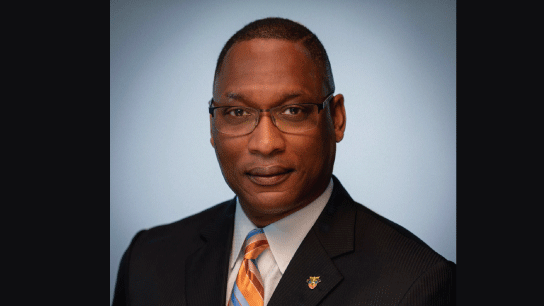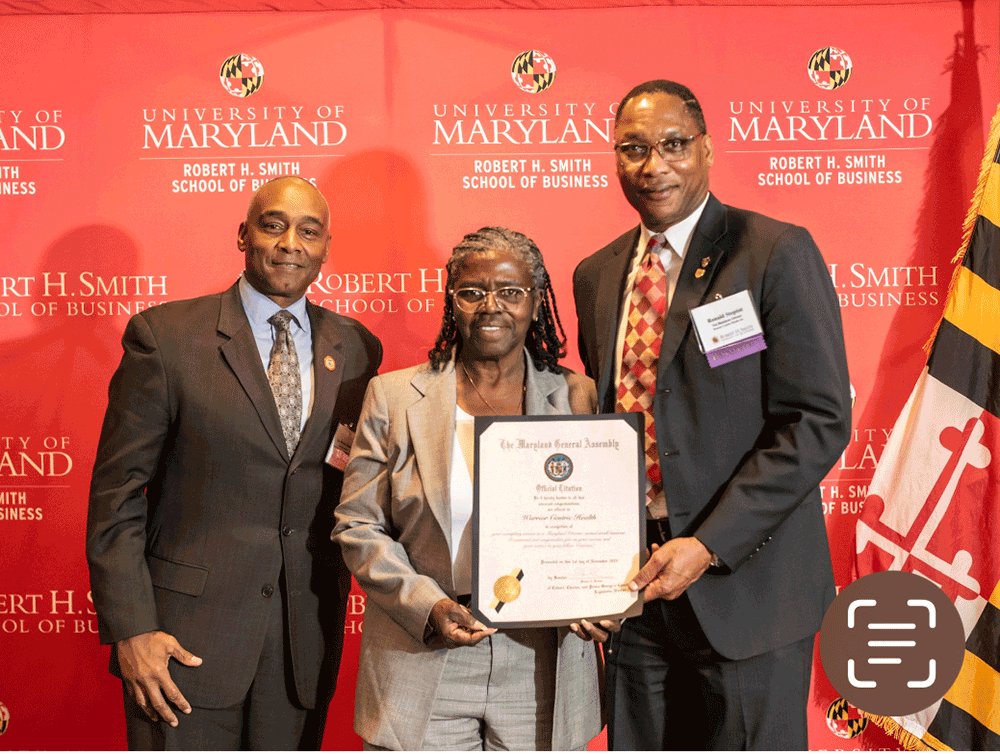
Co-founder and CEO Ron Steptoe is passionate about his Ellicott City-based company, Warrior Centric Health, and not just because of its leading-edge health solution platform; for Steptoe, an eighth generation military veteran, it’s personal. Steptoe formed a company focused on creating healthcare equity for the millions of Americans who have served or are serving the country today.
These individuals volunteer to serve their country, knowing they may need to risk their lives, only to return home and find themselves underserved when it comes to their health—individuals like Marylander Matt Fast.
Fast served in Afghanistan and Iraq; following his tour, he moved to Baltimore, worked as a police officer and served in the reserves. One weekend when he seemed particularly ill, his wife, Jessica Fast, persuaded him to go to urgent care where he was tested for strep. When the strep tests came back negative, he was sent home with advice to rest.
Matt Fast died that night due to undiagnosed myocarditis; he was 29 years old.
Later, Jessica Fast understood the connections between her late husband’s illness and the conditions he was exposed to during deployment. She imagines a different scenario that day at urgent care, one where the doctors asked the right questions, including about his military service.
Her message to veterans and service members: Tell your healthcare provider if you’ve served. It could change your treatment and even save your life.
Creating a solution
This message is one fully embraced by Steptoe and Dr. Evelyn Lewis, co-founders of Warrior Centric Health (WCH). WCH is dedicated to helping medical institutions deliver effective population health management to veterans and active-duty service members.
Steptoe had a pivotal moment around 2008. He’d read a massive report on the state of veterans’ health, and it wasn’t good.
In addition to the hundreds of thousands active-duty and veterans dealing with post-traumatic stress disorder and traumatic brain injury, Steptoe discovered that about 3.5 million people were exposed to toxic substances while serving their country. The ramifications of these toxins are far-reaching, from cancer and asthma to various chronic conditions.
“Think of Matt and others like him who served their countries, are back at home trying to work and be with their families, only to be lost to untreated conditions,” said Steptoe. “My calling is to address this veteran health crisis. WCH aims to make hospitals heroes by giving them a platform to deliver optimal care to our warriors.”
Exposing the myths
Steptoe graduated from the U.S. Military Academy at West Point and served as a leader with Pfizer’s Multicultural Business team, giving him broad military and healthcare experience. He understands the challenges facing veterans, service members and their families, a collective group he refers to as the “Warrior Community” that makes up close to a quarter of the U.S. population.
However, many believe the Warrior Community receives better medical attention than they really do. Using his expertise, Steptoe identifies three myths impacting their healthcare:
Myth 1: Veterans get almost all healthcare from the Veterans Administration (VA). In fact, over 80% of them get all
or some of their care outside the VA
hospital system.
Myth 2: The Warrior Community is healthier than civilians. While people enter the service healthy, their health often declines by the time they leave. According to WCH, about four out of five veterans report a chronic condition they didn’t have prior to enlisting.
Myth 3: Medical professionals are aware of the service experiences of Warrior Community members. WCH found that only 57% of private hospitals screen for veteran status and only 10% utilize the data to identify care gaps.
How WCH addresses the healthcare gap
WCH’s Warrior Centric Solution Suite provides a comprehensive solution to this crisis of unmet need, bringing a combination of sophisticated data and decision science, accredited education and training, robust outreach tools and credentialing to hospitals, medical centers and healthcare providers in a way that is scalable, adaptable and easy to use.
Together, Lewis and Steptoe developed the blueprint for a healthcare facility that they deem to be prepared to deliver optimum care to the Warrior Community (an Authorized WCH Facility) and the means for any facility to achieve those capabilities: the WCH® platform. The platform leverages best practices in population health management, health systems science and technology transfer from the fields of health, science, education, IT and business. It combines fully accredited e-learning, credentialing, data science and community outreach tools into an enterprise-grade solution that can deliver strong ROI.
Since being founded, WCH has received several distinctions, including the FORBES List of Top 25 Veteran-Founded Start-ups in America; the Member of the Year designation from the American Hospital Association-Institute for Diversity; and selection as a Microsoft for Startups Top-Tier Pegasus Program company.

The Essential Role of TEDCO in WCH’s Success
Steptoe credits his success to his early supporters, especially TEDCO, Maryland’s leading source of funding for early-stage, technology-based businesses.
“The support of TEDCO was so impactful,” said Steptoe. “I’d gone to Silicon Valley five times and heard ‘no’ every time. Then, I reached out to TEDCO, here in Maryland. And while they didn’t say yes right away, they also didn’t say no. They said not yet, and that kept the door open.”
According to Steptoe, TEDCO offered more than hope; the organization met with the WCH team and offered guidance, sharing benchmarks and milestones the entrepreneurs needed to reach before coming back.
In 2020, WCH met those benchmarks and received a $200,000 investment from a highly competitive round with TEDCO’s Seed Funds, which invest in early-stage, technology and life sciences companies.
Fast forward a few years and, in 2022, the value of WCH’s mission was recognized further, resulting in another investment from TEDCO, this time totaling $1M from their Venture Funds.
“Many of the investors I reached out to didn’t get it; they didn’t understand the substantial healthcare gap that existed for the Warrior Community. But Microsoft, which selected us for their Pegasus Top-Tier partner program, got it. Our angel investors who have military backgrounds got it. Vizient and the Department of Defense, which named us a SBIR/STTR Technology company, got it. And TEDCO definitely got it,” Steptoe explained.
Thankfully, in 2023, a lot more people are “getting it.” The Joint Commission recently issued a new National Patient Safety Goal to Improve Health Care Equity, and WCH offers a scalable solution to address the challenge outlined across both commercial and military systems. Plus, KPMG and WCH are collaborating to scale WCH’s Integrated Military Population Health Solution Platform in the commercial, military and government markets.
With more health care providers and investors understanding the importance of health equity for the Warrior Community, more lives saved and a better quality of life. For Steptoe and WCH, that’s the ultimate measure of success.
Source: I95 Business